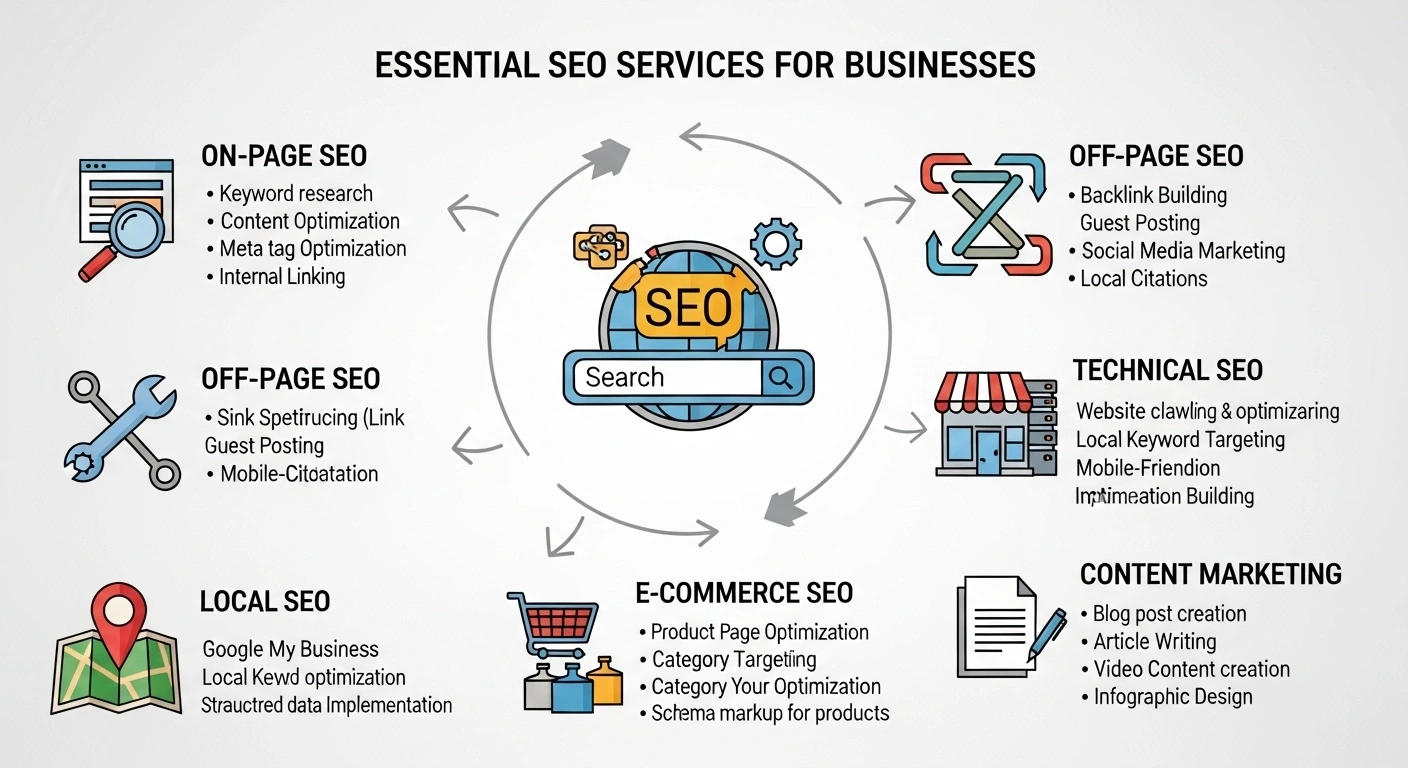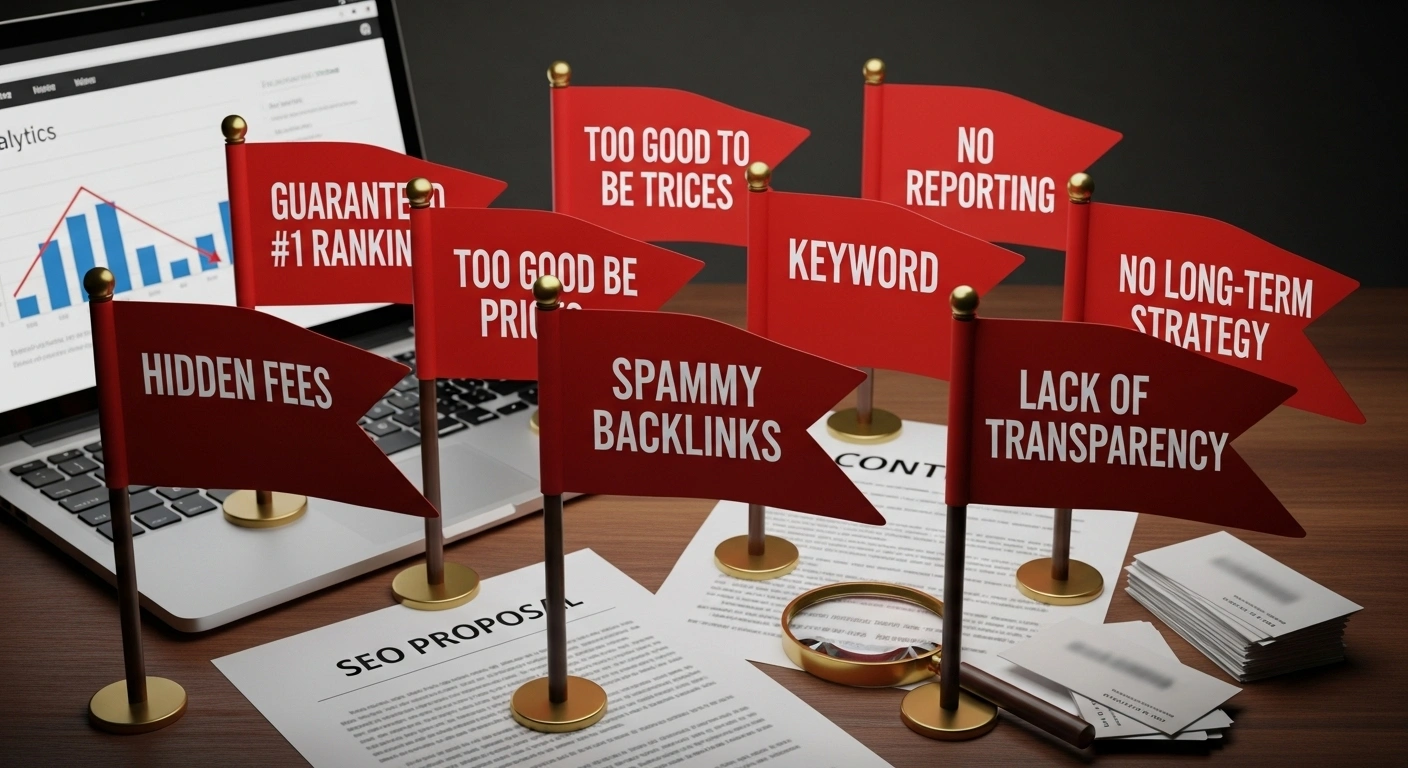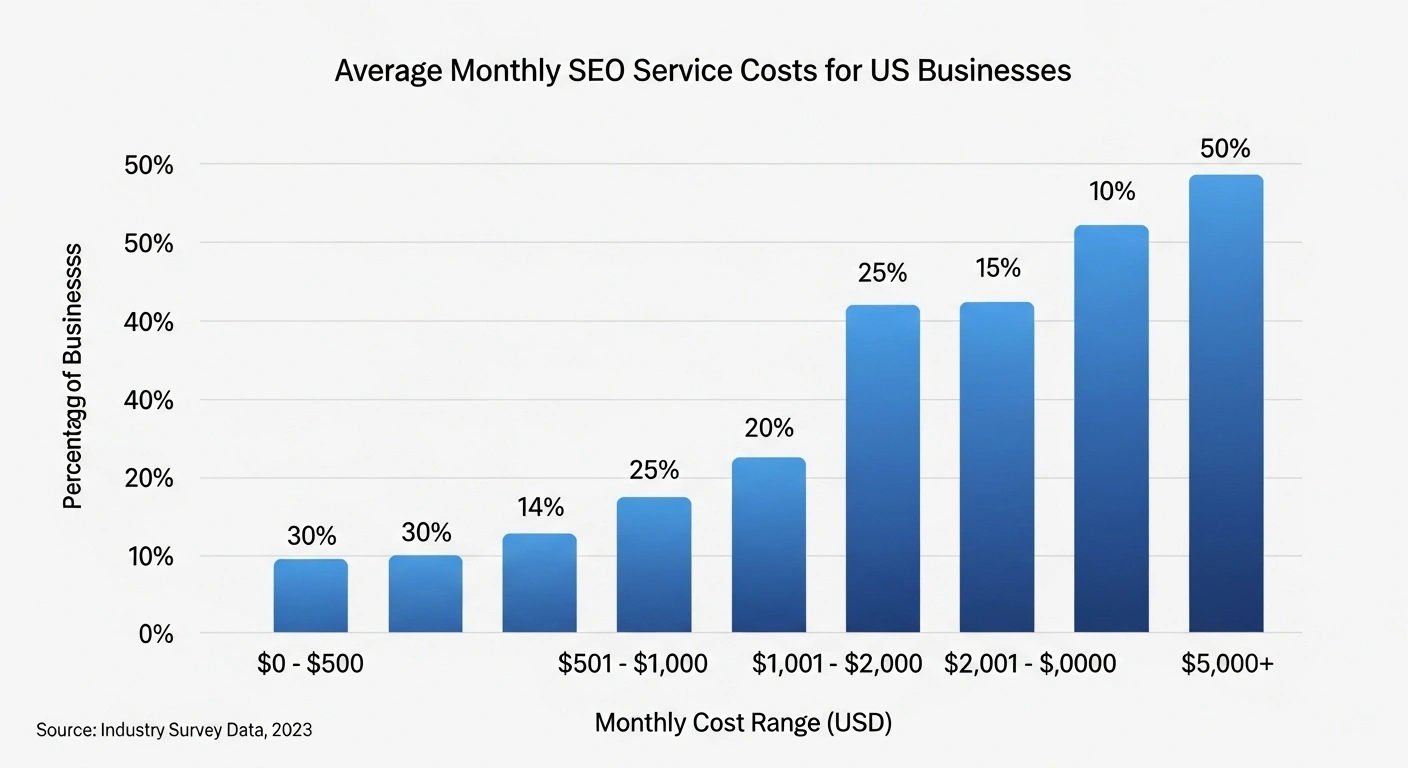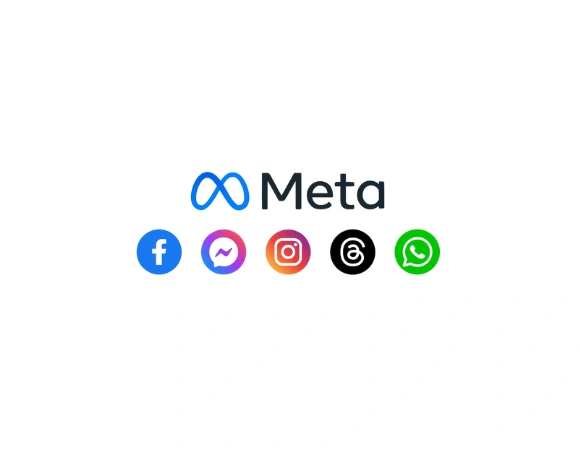How to Choose the Right SEO Service for Your US Business in 2025-2026 (A Complete Guide)

Introduction: The Most Important Marketing Decision You'll Make This Year
You’re here because you know your business needs to be visible on Google. You understand that your competitors are showing up on the first page for valuable search terms, and you want—no, need—a piece of that action. You know that Search Engine Optimization (SEO) is the key.
But that’s where the clarity ends and the confusion begins.
A quick search for "SEO services" unleashes a tidal wave of options: agencies, freelancers, consultants, and platforms, all promising to get you to the top of Google. The prices are all over the map, the promises sound too good to be true, and you have a nagging fear of investing thousands of dollars only to see zero results.
Making the wrong choice can mean wasted budgets, lost time, and even damage to your website's reputation. Making the right choice, however, can be the single most powerful catalyst for growth your business has ever seen. It means a predictable stream of qualified leads, increased brand authority, and a tangible return on your investment.
This guide is designed to cut through the noise.
We’ve created this comprehensive, no-nonsense resource specifically for US business owners like you. We will walk you through every step of the process, from understanding what you actually need to asking the right questions and spotting the red flags. By the end of this guide, you will have the clarity and confidence to choose the perfect SEO partner to help you dominate your market.
Let's build your growth engine, the right way.
Chapter 1: First Things First: Why Your Business Goals Must Drive Your SEO Strategy
Before you can choose the right SEO service, you must define what "success" looks like for your business. SEO is not a one-size-fits-all solution; it's a tool to achieve specific business objectives. A great SEO partner won't just talk about rankings; they'll ask about your business.
Be prepared to answer these questions:
- What is your primary goal? Are you trying to generate more leads through a contact form? Increase online sales for your e-commerce store? Drive foot traffic to your local brick-and-mortar business? Boost brand awareness in a new market?
- Who is your ideal customer? What are their pain points? What questions are they asking Google? Understanding your audience is the foundation of any successful SEO campaign.
- What is your customer's lifetime value (LTV)? Knowing how much a new customer is worth helps determine a realistic SEO budget and measure return on investment (ROI).
- Who are your main competitors? Who shows up when you search for your most important products or services? A good SEO strategy involves analyzing their strengths and weaknesses.
Why this matters: The answers to these questions will dictate the type of SEO you need.
- A local plumber in Dallas needs Local SEO to rank in the "map pack."
- A national e-commerce site selling handmade leather goods needs E-commerce SEO to optimize product pages and drive sales.
- A B2B software company needs a Content-Driven SEO strategy to attract and educate potential buyers through blog posts and whitepapers.
Takeaway: Don't start your search by looking for an "SEO provider." Start by defining your business goals. Then, look for a partner who can build a customized SEO strategy to achieve them.
Chapter 2: Decoding the Menu: Understanding the Different Types of SEO Services
"SEO" is a broad term. A competent provider will offer a blend of services that fall into several key categories. Understanding these will help you decipher their proposals and ensure they are offering a comprehensive strategy.

1. On-Page SEO
This refers to all the optimizations done on your website's pages to help search engines understand their content and context.
- Keyword Research & Strategy: Identifying the terms your ideal customers are searching for.
- Content Creation & Optimization: Writing high-quality, valuable blog posts, service pages, and product descriptions that target those keywords.
- Title Tag & Meta Description Optimization: Crafting the headlines and descriptions that appear in search results to maximize click-through rates.
- Header Tags (H1, H2, H3): Structuring your content logically for both users and search engines.
- Internal Linking: Connecting pages on your site to distribute authority and help Google discover content.
2. Off-Page SEO
These are actions taken outside of your website to build its authority and reputation. This is primarily about building trust.
- Link Building (Backlinks): Earning links from other reputable websites. This is one of Google's most powerful ranking factors, acting as a "vote of confidence" from other sites.
- Digital PR: Getting your brand mentioned on industry news sites, blogs, and publications.
- Google Business Profile (GBP) Management: Optimizing your GBP listing for local search visibility.
- Online Reputation Management: Encouraging and managing customer reviews.
3. Technical SEO
This is the foundation upon which all other SEO efforts are built. It ensures your website can be efficiently crawled, indexed, and rendered by search engines.
- Website Speed & Performance: Ensuring your site loads quickly for users, especially on mobile devices.
- Mobile-Friendliness: Making sure your site provides a seamless experience on all screen sizes.
- Site Architecture: Organizing your website's structure in a logical way.
- XML Sitemap: A roadmap that helps Google find all your important pages.
- Crawlability & Indexability: Fixing errors that might prevent Google from accessing and listing your site in its search results.
- Schema Markup (Structured Data): Adding specific code to help Google understand your content better and display rich snippets (like star ratings or event info) in search results.
4. Local SEO
This is a specialized subset of SEO crucial for businesses that serve a specific geographic area.
- Google Business Profile Optimization: The cornerstone of local search, this involves optimizing your listing with correct information, photos, posts, and services.
- Local Citation Building: Getting your business name, address, and phone number (NAP) listed consistently across relevant online directories.
- Location-Specific Page Creation: Building dedicated pages for each city or service area you cover.
A comprehensive SEO strategy almost always involves elements from all these categories. Be wary of any provider that only focuses on one area while ignoring the others.
Chapter 3: The Big Three: SEO Agency vs. Freelancer vs. In-House Team
Once you know what you need, you need to decide who will do the work. There are three primary models, each with distinct pros and cons.

1. The SEO Agency
An SEO agency is a company of experts who provide SEO services to multiple clients.
- Pros:
- Diverse Expertise: You get access to a team of specialists—a technical SEO expert, a content writer, a link-building strategist, an account manager, etc.
- Resources & Tools: Agencies invest in expensive, cutting-edge SEO tools (like Ahrefs, SEMrush, Moz Pro) that would be cost-prohibitive for a single business.
- Proven Processes: They have established workflows for onboarding, reporting, and execution, leading to more predictable results.
- Scalability: An agency can easily scale its efforts up or down as your business needs change.
- Cons:
- Higher Cost: Generally the most expensive option due to overhead and the team-based approach.
- Less Individual Focus: You are one of several clients. While you should have a dedicated point of contact, the team's attention is divided.
Best for: Businesses that want a comprehensive, "done-for-you" solution and have the budget to access a team of specialized experts.
2. The SEO Freelancer
An SEO freelancer is a self-employed individual who offers specialized SEO services.
- Pros:
- Lower Cost: With less overhead, freelancers are often more affordable than agencies.
- Direct Communication: You work directly with the person doing the work, which can lead to faster communication.
- Niche Specialization: Many freelancers are deep specialists in one area, such as technical SEO for Shopify or local SEO for contractors.
- Cons:
- Limited Bandwidth: A single person can only do so much. Complex, multi-faceted campaigns can be challenging.
- "Key Person" Risk: If your freelancer gets sick, goes on vacation, or takes on another large client, your project can stall.
- Limited Skillset: It's rare to find one person who is a world-class expert in technical SEO, creative content writing, and digital PR.
Best for: Businesses with smaller budgets, well-defined needs (e.g., "we just need a technical audit"), or those who want to supplement an in-house marketing team.
3. The In-House Team
This involves hiring one or more employees to handle SEO full-time.
- Pros:
- Total Dedication: Your SEO team is 100% focused on your business and its goals.
- Deep Product/Industry Knowledge: They become true experts in your specific niche.
- Seamless Integration: They can work closely with your sales, product, and content teams.
- Cons:
- Highest Cost & Commitment: This is by far the most expensive option when you factor in salaries, benefits, training, and tools.
- Hiring Challenge: Finding and retaining top SEO talent is extremely difficult and competitive.
- Risk of Stagnation: An in-house team can sometimes lack the exposure to the diverse problems and industry shifts that an agency sees daily.
Best for: Large, well-funded companies where SEO is a core, mission-critical component of the business model.
For most small to medium-sized US businesses, hiring an SEO agency provides the best balance of expertise, resources, and cost-effectiveness.
Chapter 4: The Anatomy of a Great SEO Partner: 7 Non-Negotiable Qualities
Regardless of whether you choose an agency or a freelancer, there are universal qualities that separate the great from the mediocre. Use this as your scorecard.
- Transparency and Education: A great partner doesn't hide behind jargon. They take the time to explain their strategy, what they're doing, why they're doing it, and what results you can expect. They should provide clear, understandable reports.
- A Data-Driven Approach: Gut feelings have no place in SEO. Your partner should base their decisions on data from keyword research, competitor analysis, and your website's analytics. They should talk about metrics, baselines, and KPIs (Key Performance Indicators).
- Focus on Custom Strategies, Not "Packages": If a company's first move is to push you into a "Gold, Silver, or Bronze" package without first performing a deep dive into your business, run. Every business is unique, and a powerful SEO strategy must be tailored to your specific goals, market, and competition.
- Verifiable Proof of Results (Case Studies & Testimonials): They must be able to demonstrate past success. Ask for case studies relevant to your industry or for businesses with similar goals. Look for specific data: "We increased organic leads by 150% in 12 months for a B2B client" is far more powerful than "we get results."
- Excellent Communication: A good SEO relationship requires clear, consistent communication. You should know who your point of contact is, how often you'll receive reports, and how quickly you can expect a response. Set these expectations from day one.
- Commitment to "White-Hat" SEO: This is critical. "White-hat" SEO refers to ethical practices that align with Google's guidelines. "Black-hat" SEO uses spammy, manipulative tactics to try and trick search engines. While black-hat tactics might offer short-term gains, they inevitably lead to harsh penalties, including getting your site completely removed from Google. Your partner must explicitly commit to white-hat strategies.
- They Focus on Your Business Growth, Not Just Rankings: Ranking #1 for a keyword that no one searches for is useless. A true SEO partner understands that the ultimate goal is not just to rank higher but to drive more qualified traffic that converts into leads and sales. They should be just as interested in your conversion rates as they are in your keyword positions.
Chapter 5: Major Red Flags: How to Spot and Avoid Bad SEO Providers
Protecting your investment is just as important as making it. The SEO industry is unfortunately filled with providers who use smoke and mirrors to sell ineffective or even harmful services. Watch out for these warning signs.

🚩 Red Flag #1: "We Guarantee #1 Rankings on Google."
This is the oldest and most dangerous lie in the SEO book. No one can guarantee a #1 ranking on Google, not even Google employees. There are hundreds of factors in Google's algorithm, which changes constantly. Reputable providers will guarantee their process and effort, not a specific rank.
🚩 Red Flag #2: "We have a secret sauce" or "We have a special relationship with Google."
There are no secrets in SEO. The principles are well-documented by Google itself. Success comes from diligent, strategic execution of best practices, not from some proprietary trick. This claim is designed to prevent you from understanding what they're actually doing.
🚩 Red Flag #3: A Lack of Transparency in Their Process.
If they are vague about what they will actually be doing for you each month, that's a problem. You should know what content they're creating, what technical fixes they're implementing, and what kind of links they are building. A good partner is proud to show you their work.
🚩 Red Flag #4: Offering Instant Results.
SEO is a long-term investment. It's like planting a tree, not flipping a switch. You should start seeing positive momentum within 3-6 months, with significant results typically taking 6-12 months or more, depending on the competitiveness of your industry. Anyone promising page one results in a few weeks is selling snake oil.
🚩 Red Flag #5: Focusing Entirely on Link Quantity over Quality.
In the world of backlinks, quality is everything. One link from a major industry publication is worth more than a thousand links from low-quality, spammy directories. Ask about their link-building philosophy. If they talk about "link packages" or promise "50 links per month," be very cautious.
🚩 Red Flag #6: Opaque or Confusing Reporting.
If their monthly reports are just a jumble of vanity metrics (like impressions or an arbitrary "visibility score") without connecting them to your business goals (leads, sales, traffic), they are likely hiding a lack of real progress. Reports should be clear, concise, and focused on the KPIs that matter to you.
🚩 Red Flag #7: Incredibly Low Prices.
Good SEO takes time, expertise, and expensive tools. If a price seems too good to be true ($200/month for "full SEO"), it absolutely is. These low-cost providers often use automated, black-hat techniques that will get your site penalized, or they simply do nothing at all.
Chapter 6: The Ultimate Vetting Checklist: 15 Critical Questions to Ask Any Potential SEO Partner
You're now armed with the knowledge to separate the good from the bad. It's time to get on a call. Use these questions to interview potential agencies or freelancers. Their answers will tell you everything you need to know.
Questions About Their Strategy & Process
- Based on my website and business goals, what do you see as the biggest SEO opportunity for my company?
- Can you walk me through the first 90 days of an SEO campaign with you? What are the key deliverables?
- How do you perform keyword research and decide which terms to target?
- What is your approach to content creation and how will you ensure it aligns with my brand voice?
- Can you describe your link-building philosophy and strategy? Can you provide examples of links you have secured for other clients?
- How do you approach technical SEO, and what tools do you use to audit a website?
Questions About Their Experience & Results
- Can you share 1-2 case studies of clients in a similar industry or with similar goals? What were the specific results and timeline?
- What is the typical timeframe in which your clients begin to see a tangible return on their investment?
- How do you stay up-to-date with Google's algorithm changes?
- Who will be my main point of contact, and what is their level of experience?
Questions About Reporting & Communication
- What metrics do you include in your monthly reports? Can I see a sample report?
- How do you tie your SEO efforts back to my core business goals, like leads and revenue?
- How often will we meet or have a call to discuss progress and strategy?
- What is the structure of our contract? Is it month-to-month or a longer-term commitment?
- What do you need from me or my team to be successful?
Pay close attention not just to what they say, but how they say it. Are they confident, transparent, and educational? Or are they evasive, salesy, and full of jargon? Trust your gut.
Chapter 7: Demystifying the Cost: A Realistic Look at SEO Pricing Models in the US
Let's talk about the bottom line. SEO pricing can be confusing, but it generally falls into one of three models.

1. Monthly Retainer
This is the most common model for comprehensive SEO services. You pay a fixed fee each month for an ongoing, agreed-upon set of deliverables.
- What it's for: All-inclusive SEO strategies that cover on-page, off-page, and technical SEO.
- Typical US Market Price:
- Small Businesses / Local SEO: $1,500 - $3,000 per month
- Medium-Sized Businesses (SMEs): $3,000 - $7,000 per month
- Large / Competitive Niches: $7,000 - $20,000+ per month
- Why it's popular: It provides a predictable budget and allows for the development of a long-term strategy, which is essential for sustainable SEO success.
2. Project-Based Pricing
This involves a one-time fee for a specific, defined project with clear deliverables.
- What it's for: Specific tasks like a technical SEO audit, a one-time content strategy build-out, a website migration, or a penalty recovery service.
- Typical US Market Price: Highly variable, from $2,000 for a basic audit to $25,000+ for a major site migration project.
- Why it's used: It's perfect for businesses that have a specific SEO problem to solve or need foundational work done before committing to a monthly retainer.
3. Hourly Consulting
You pay an hourly rate for access to an SEO expert's time and advice.
- What it's for: Strategic guidance, training for your in-house team, or troubleshooting a specific, complex issue.
- Typical US Market Price: $150 - $400+ per hour, depending on the consultant's experience and reputation.
- Why it's used: It offers flexibility for businesses that don't need ongoing execution but require high-level strategic input.
A note on value: Don't choose an SEO provider based on price alone. An agency charging $5,000/month that generates $25,000/month in new business is a far better investment than an agency charging $1,500/month that generates nothing. Focus on the potential ROI, not just the cost.
Chapter 8: Beyond Rankings: How to Properly Measure SEO Success and ROI
How do you know if your investment is actually working? Tracking keyword rankings is part of the story, but it's far from the most important chapter. A sophisticated SEO partner will help you track the metrics that truly impact your bottom line.
Your reports and dashboards should focus on:
- Organic Traffic: An increase in the number of visitors coming to your site from non-paid search results. Is the overall trend moving up and to the right?
- Keyword Visibility: Not just tracking a handful of "vanity" keywords, but looking at the total number of keywords your site is ranking for. Are you gaining visibility for a wider range of relevant search terms?
- Click-Through Rate (CTR): The percentage of people who click on your website after seeing it in the search results. This can indicate how compelling your title tags and meta descriptions are.
- Conversion Rate: This is the ultimate test. What percentage of your organic traffic is completing a desired action (filling out a form, making a purchase, calling your business)?
- Leads & Sales from Organic Search: Using tools like Google Analytics, you can track exactly how many leads and how much revenue are being generated directly from your SEO efforts.
- Return on Investment (ROI): The final calculation: (Revenue from SEO - Cost of SEO) / Cost of SEO. A positive ROI means your SEO is not a cost; it's a profitable investment.
Takeaway: Demand reporting that connects SEO activities to business outcomes. If your provider can't show you how their work is leading to more leads and sales, they aren't measuring what matters.
Chapter 9: A Modern Reality: Does Your SEO Agency Need to Be in the Same City?
A common question for US business owners is whether they should hire a local agency or if they can work with a team located elsewhere—even in another country. In today's digitally connected world, the answer is clear: expertise and communication matter far more than geographic proximity.
The internet has democratized talent. Limiting your search to your immediate zip code means you could be missing out on a more skilled, more experienced, or more cost-effective partner.
Here’s what truly matters when evaluating a non-local or international agency:
- Proven Understanding of the US Market: Do they have experience working with US-based businesses? Do they understand the nuances of American consumer search behavior? Their case studies and client roster should answer this.
- Seamless Communication: Do they have a clear process for communication that overcomes time zone differences? Look for dedicated account managers, scheduled video calls, and responsive email and project management systems. A well-run global agency will make you feel like they're right next door.
- Focus on a Global Talent Pool: Often, global agencies can build teams of highly specialized experts from around the world, bringing a diversity of thought and skill that a small local shop might not be able to match.
- Cost-Effectiveness and Value: A global agency may have different operational costs, allowing them to offer highly competitive pricing without sacrificing the quality of talent or the sophistication of the tools they use.
The Bottom Line: Don't let geography be a barrier. Prioritize skill, strategy, communication, and proven results. A phenomenal agency in a different time zone is infinitely better than a mediocre agency down the street.
Chapter 10: Your Next Step: Making a Confident Decision
You've made it. You now know more about choosing an SEO service than 99% of business owners. You understand the different types of SEO, the qualities of a great partner, the red flags to avoid, the questions to ask, and the metrics that matter.
The feeling of being overwhelmed is gone, replaced by a sense of clarity and control. You are no longer just buying a service; you are making a strategic investment in the future of your business.
The process is simple:
- Define your goals.
- Shortlist 2-3 potential partners.
- Use the questions in this guide to interview them.
- Review their proposals and case studies.
- Choose the partner that gives you the most confidence and presents the most logical, data-driven strategy for your growth.
You are ready to find a partner who will help you turn search engines into your most powerful channel for customer acquisition.
Frequently Asked Questions (FAQ)
Q: How long does it really take to see results from SEO?
A: While you may see some positive movement in rankings and traffic within 3-4 months, significant, business-impacting results typically take 6 to 12 months. SEO is a long-term strategy, and the results compound over time. Be wary of anyone promising faster results.
Q: Can I do SEO myself?
A: You can certainly learn and implement basic SEO. However, advanced SEO is a full-time job that requires deep expertise and expensive tools. For most business owners, their time is better spent running their business while leaving the complex work of SEO to a dedicated professional or team.
Q: What's the difference between SEO and SEM?
A: SEO (Search Engine Optimization) focuses on earning traffic through unpaid, organic search results. SEM (Search Engine Marketing) is a broader term that includes SEO as well as paid search advertising (like Google Ads), also known as PPC (Pay-Per-Click).
Q: Is SEO a one-time thing or an ongoing process?
A: SEO is definitely an ongoing process. Your competitors are always working to outrank you, and Google's algorithm is constantly changing. Consistent effort in content creation, link building, and technical optimization is required to maintain and improve your rankings over time.
Q: How much should I budget for SEO?
A: As detailed in Chapter 7, a realistic budget for a small to medium-sized US business typically starts around $1,500 - $3,000 per month for a comprehensive retainer with a reputable agency. The right budget depends on your goals, your industry's competitiveness, and the scope of work required.




